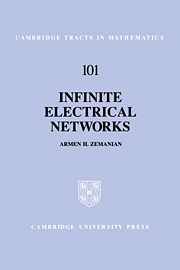1 - Introduction
Published online by Cambridge University Press: 05 February 2012
Summary
The purposes of this initial chapter are to present some basic definitions about infinite electrical networks, to show by examples that their behaviors can be quite different from that of finite networks, and to indicate how they approximately represent various partial differential equations in infinite domains. Finally, we explain how the transient responses of linear RLC networks can be derived from the theory of purely resistive networks; this is of interest because most of the results of this book are established in the context of resistive networks.
Notations and Terminology
Let us start by reviewing some symbols and phraseology so as to dispel possible ambiguities in our subsequent discussions. We follow customary usage; hence, this section may be skipped and referred to only if the need arises. Also, an Index of Symbols is appended for the more commonly occurring notations in this book; it cites the pages on which they are defined.
Let X be a set. X is called denumerably infinite or just denumerable if its members can be placed in a one-to-one correspondence with all the natural numbers: 0, 1, 2,. … X is called countable if it is either finite or denumerable. In this book the set of branches of any network will always be countable.
The notation {x ∈ X: P(x)}, or simply {x: P(x)} if X is understood, denotes the set of all x ∈ X for which the proposition P(x) concerning x is true.
- Type
- Chapter
- Information
- Infinite Electrical Networks , pp. 1 - 29Publisher: Cambridge University PressPrint publication year: 1991

